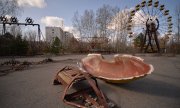Stop nuclear power plant in Belarus
Today, 30 years after Chernobyl, the nuclear threat comes from a different direction, warns Lietuvos rytas referring to the construction of a nuclear power plant in Astravyets, Belarus, on the border with Lithuania:
“There is no plan for how to evacuate Vilnius if an accident occurs. Minsk couldn't care less about the Espoo agreement under which states must coordinate an environmental impact assessment with their neighbours. That wasn't to be expected given that Belarus isn't a democratic country but a dictatorship led by Lukashenko, who is always balancing between East and West. … But Lithuania could still mess up the Belarusians' plans. Minsk's request to use the Lithuanian hydroelectric power plant in Kruonis as a potential reserve has already been turned down. … And Lithuanian Energy Minister Rokas Masiulis also seems to have been pretty successful in persuading other neighbours not to buy electricity from Belarus.”
Nuclear power still vital despite risks
Nuclear power remains essential for the time being, Savon Sanomat believes:
“The lesson of Chernobyl is that nuclear power is dangerous in the wrong hands. A growing danger is posed by terrorism, which could cause major damage if it targets a nuclear power station. The need to prevent terrorist attacks obliges us to tighten the security requirements for nuclear plants. ... Nevertheless despite the risks it has become clear that all industrial countries would have a hard time getting by without nuclear power. The emissions reduction goals make this all the more difficult, because at this stage renewable energies cannot completely replace fossil fuels. In Finland, too, nuclear power will be needed in the transitional phase before sun, wind and other clean forms of energy are developed to the point where they are cheap and reliable enough.”
The trauma after the "reserve exercise"
Postimees remembers the men Estonia sent to Chernobyl to help in 1986:
“As a result of the cover-up and the coercive methods of the communist regime, the directly measurable consequences of the disaster were compounded by feelings of fear and mistrust traces of which are still visible today. On the sunny 28th of April, no one could predict that roughly 5,000 Estonian men would soon be enlisted in an army 'reserve exercise' and be ordered to gather together radioactive waste with nothing more than simple shovels. ... Objective measurements have proven that the men were not exposed to excessive amounts of radioactivity, and their fatality rate is no higher than that of other Estonian men of the same age. Nevertheless this enforced measure pushed through 30 years ago has left its mark in these men's psyches.”

